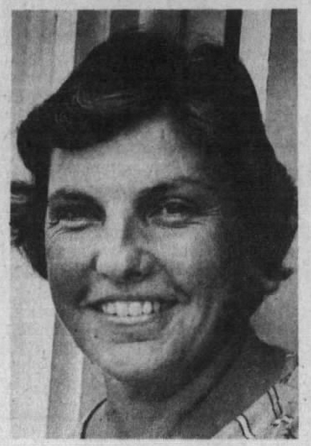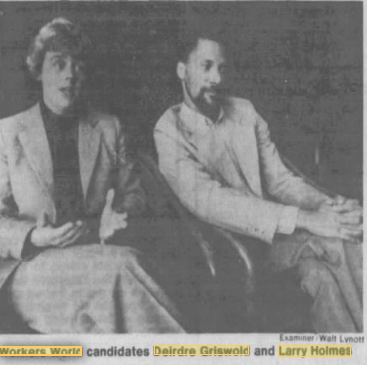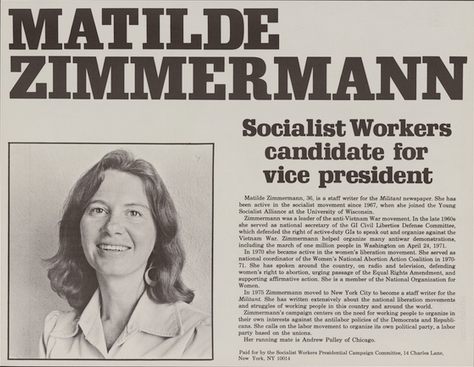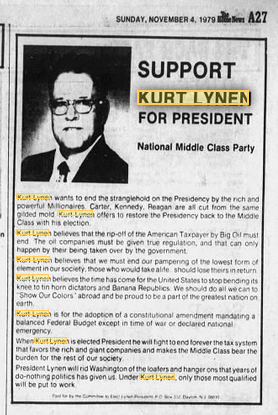Below: The Utah ballot line where the AIP was known as the Independent American Party
Eileen Mary Shearer, December 24, 1920 (Detroit, Mich.) - December 20, 2003 (Lemon Grove, Calif.)
VP candidate for American Independent Party (aka Conservative Party aka American Party aka Independent aka Independent American Party aka Constitution Party) (1980)
Running mate with nominee: John Richard Rarick (1924-2009)
Popular vote: 40,906 (0.05%)
Electoral vote: 0/538
The campaign:
In keeping their tradition of nominating Southern politicians with a segregationist history for President the American Independent Party selected former Rep. John Rarick (D-La.) in 1980. Listed as a the second most conservative Democratic member of the House between 1937-2002, the transplanted Hoosier now in Louisiana had connections with the White Citizens' Council, John Birch Society, and Liberty Lobby.
Rarick had been an open supporter of the AIP since George Wallace's run in 1968 and easily won the 1980 nomination over Percy Greaves, who was already the Presidential candidate of the American Party. Eileen Shearer, wife of AIP founder William Kennedy Shearer, was chosen as the VP.
According to Shearer the AIP elders were gathered in the wee hours in a Sacramento hotel room trying to select a running-mate when Rarick turned to her and said, "Eileen, I want you. Let's show 'em we really believe in equal rights for women."
"I thought he was kidding," Shearer related, "I hadn't even considered running. And if he wasn't kidding, I didn't see how I could accept. Why, I hadn't in fact taken a dress to the convention. I didn't think I'd need one."
She said, "My gosh, John. I don't even have a dress for the main event." He said, "Aw, that's all right. I never saw a vice-president in a dress anyway."
Shearer recalled, "How could I refuse a vote of confidence like that?"
The AIP 1980 platform included favoring a balanced budget and high tariffs, limited federal regulations, cuts in public welfare, opposition to busing, opposition to abortion, eliminate the draft, end personal income tax, no Equal Rights Amendment, protecting unions, encouraging domestic oil production while developing alternative energy resources, supported restricting immigration, opposed the UN and SALT II and giving away the Panama Canal. Although Reagan was in line with many of their policies, they did not trust him to follow through. The AIP in 1980 went to great pains to claim their racist days were over and now they were a populist party "taking the yoke off middle-class Americans" according to Shearer.
In addressing the two-party system Shearer told the press, "No matter what the administration is, policy doesn't change. We keep floundering in the same old waters. And that's why the two-party system as we know it is going to shatter. Nothing handed down by God says we have to have two parties, the Democrats and the Republicans. I'd like to see some distinct parties where you've really got a choice. It's coming. You'll see ... John Anderson's meteoric rise shows how people are searching for a vehicle to express themselves. There's going to be a realignment in this country, and we are going to be in a strong position after that."
On the ballot in eight states they had their strongest popular vote results in Alabama 1.12%, Rarick's home state of Louisiana 0.67%, Idaho 0.24%, and South Carolina 0.20%. After this election the AIP faded away as a national party (although remained intact in California, sort of) and became absorbed into other political movements.
Election history:
1976 - American Independent Party nomination for Vice-President - defeated
Other occupations: real estate
Buried: Glen Abbey Memorial Park (Bonita, Calif.)
Notes:
Cousin to Sen. William F. Knowland.
Previously a Republican.
Came to California in 1939 to become a singer.



















































